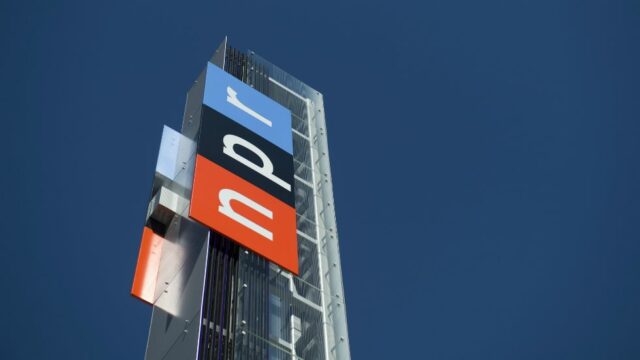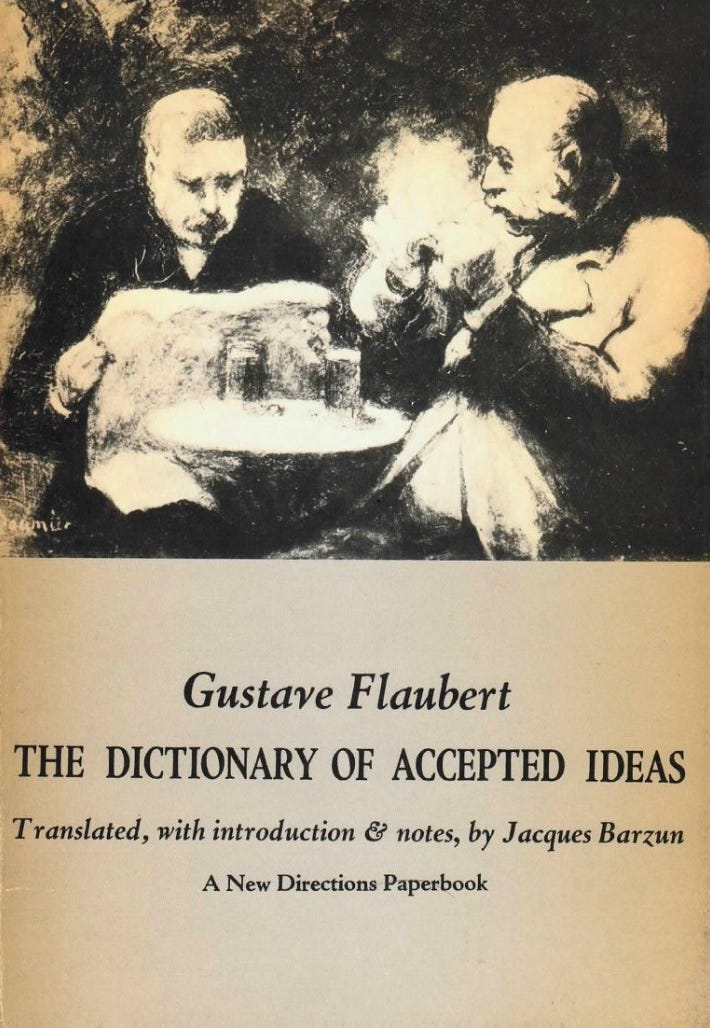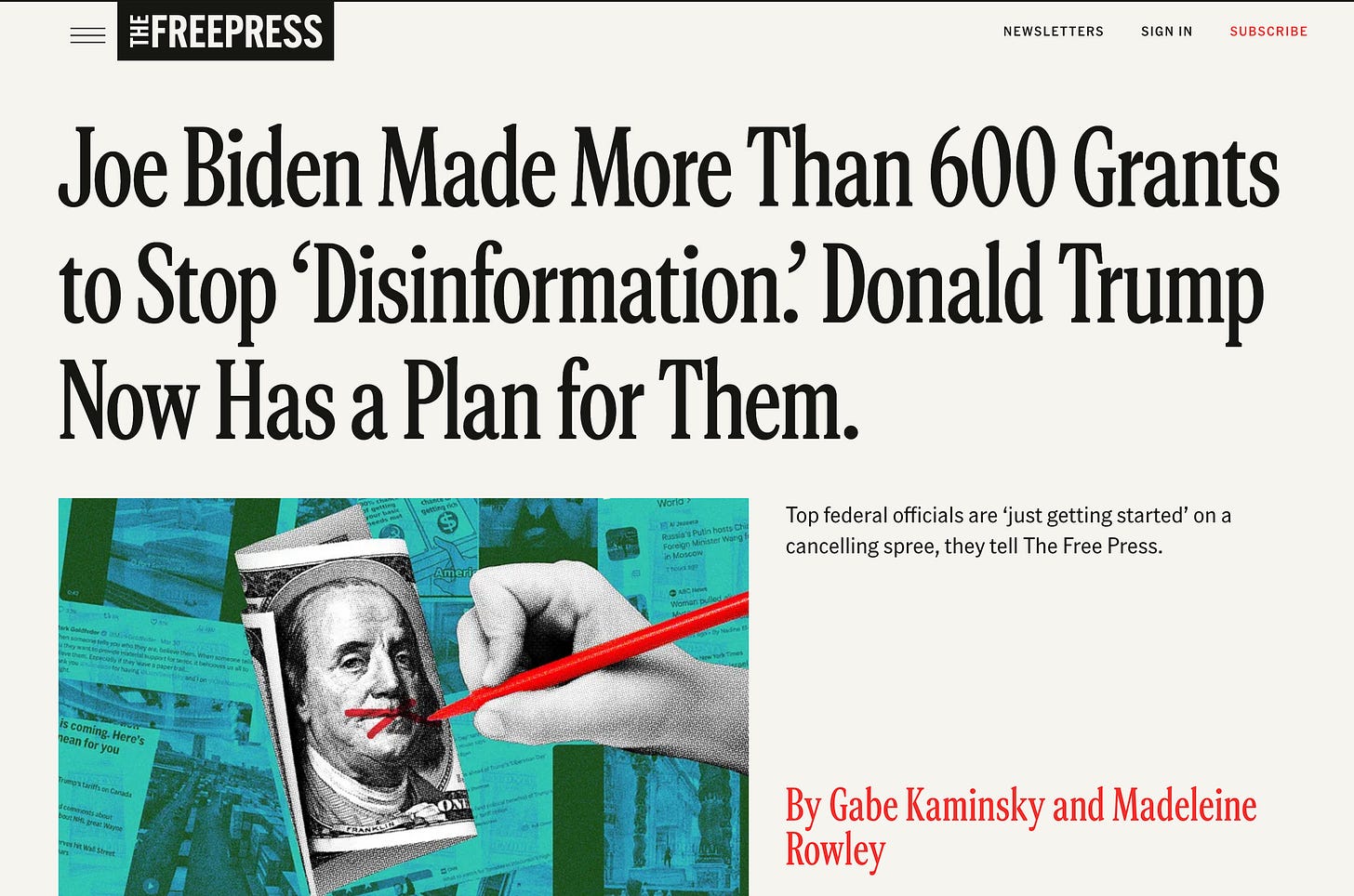NPR Should Be Axed Because It’s Anti-Thought, Not Anti-Trump

NPR is a small piece of a vast subsidized groupthink bureaucracy, which needs to be cut.
After reading Madame Bovary in college I bought the unfinished novel Bouvard and Pécuchet, one of the last things Flaubert wrote. It’s a furious satire about two bourgeois clerks with no ideas of their own who come into a fortune, travel the world and live through great events, and ultimately return home having learned nothing, despite seeing everything. In American terms, it’s Dumb and Dumber for pseudo-intellectuals. I was too young to appreciate it (it was an older man’s final middle finger to the world’s unrepentant stupidity) but there was a prize at the end.
The Dictionary of Received Ideas is often tacked to the back of the novel. It’s believed Flaubert meant to publish it either as an appendix, or as a fictional creation of the book’s two idiot-heroes, whose conversations are just exchanges of clichés (“In the long run, solitude is very sad,” or “The beautiful is the beautiful, the sublime the very beautiful”). The “dictionary” is just a monster collection of these empty sayings, sometimes written as instructions on how and what to say in society, as in:
- AMUSING – Must be attached to all remarks: “How amusing!”
- HEAT – Always unbearable.
More often, entries explained what views to hold:
- DISSECTION – An outrage against the majesty of death.
- ICE CREAM – It is dangerous to eat it.
- LEGALITY – Legality is killing us. With it, no proper government is possible.

Flaubert was nearly driven mad by these ear-piercing snippets of conventional wisdom. He said he wrote Bouvard and Pecuchét to “vomit back onto my contemporaries the disgust they inspire in me.” To be trapped in a world of clichés would seem tyrannical enough to that kind of mind, but what if all those dead phrases and canned non-thoughts were mandatory? What if they were factory-produced as part of a state enterprise? What if “received ideas” were dumped on the public with military regularity, and in conjunction with prohibitions against saying anything else?
From a Friday story about National Public Radio in the Washington Post:
President Donald Trump signed an executive order on Thursday evening seeking to prohibit federal funding for NPR and the Public Broadcasting Service (PBS). The order, which could be subject to legal challenge, called the broadcasters’ news coverage “biased and partisan…”
An NPR spokesperson said early Friday that “NPR’s editorial practices and decision-making are independent and free from outside influence…”
The zany, sociology-prof-on-molly vibe at NPR is no longer the big story in America. Donald Trump’s unprecedented “assault on our most fundamental rights” is. Just ask NPR, which of course is the problem.
Once a great American institution, NPR has become a state-sponsored version of Flaubert’s nightmare. Why it has to go:Subscribed
The station doubtless thinks it’s engaged in “public service journalism” by cranking out piles of stories with headlines like Trump nominee gives misleading testimony about ties to alleged ‘Nazi sympathizer’, Trump cuts demolish agency focused on toxic chemicals and workplace hazards, Asian American voters backed Trump in Nevada. Here’s how they feel about him now, The U.S. set the global order after WWII. Trump has other plans, A legal architect of Guantanamo questions Trump’s El Salvador plan, and on, and on. Its editors either don’t realize they’ve built an abjectly partisan political operation, or, more likely, they’ve been at this so long, they believe ideological uniformity is truth, and by extension, just “the news.”
It would be depressingly easy to create a 2025 edition of the Dictionary of Received Ideas just by tweaking NPR texts:
- JOURNALISM – Advances the conversation. Stands out for its thorough research, diverse sourcing, fairness, and fact-checking. George Clooney says the press has a duty to “always question authority.”
- THIN – It’s back in, but did it ever leave? It’s easier for thin people when it comes to employment and education. With fatphobia, why are so many people comfortable saying the quiet part out loud?
- RACISM – A public health issue. The accumulated stress from institutional racism has documented effects. Mentorship for Black medical students is crucial as they navigate a healthcare system that is not always welcoming. There’s a new computer algorithm that more accurately illustrates Black hair. If we don’t keep talking about it, whiteness becomes the default for everything.
- AWKWARDNESS —Part of our lives whether we like it or not. But what if we put the embarrassment aside and embraced our awkward selves?
If Flaubert had access to NPR’s search tool, he could have a sequel book in six hours. The only challenge would be figuring out how to limit the most important entry:
- TRUMP – Poses a global threat to democracy. Conspiracy theories about Covid fueled his support among Christian nationalists. He’s a convicted felon now, but what comes next? Meet the conservative women who are keeping their votes for Harris a secret. Instead of a final plea for unity, embraced racist jokes about Latinos. Meet former Obama ethics czar Norm Eisen. His assault on the First Amendment is historic…
About that: for every unnerving addition to the censorship toolkit that’s come out of this presidency (like the reported expansion of “anti-BDS” rules), there remain dozens of federally funded entities that exist for one of two reasons: to promote groupthink, or stamp out the absence of it. NPR is at the top of the list. Its problem isn’t that it’s anti-Trump, or that it retains its weird addiction to stories like “Bringing diversity to Maine’s nearly all-white lobster fleet” or “Fat Phobia And Its Racist Past And Present” (though that stuff is nuts), but because it’s the most visible symbol of a thought-suppressing bureaucracy that’s not really compatible with our system of media or government.
The $535 million the Corporation for Public Broadcasting doles out to stations around the country isn’t a lot, in the scheme of overall federal spending. I’d argue the state should feel queasy about spending any amount of the taxpayer’s money on efforts to propagandize against his or her political choices, and that the CPB would properly be shut down overnight if it was as near-exact a mirror of Fox or the RNC press page as NPR is to Democrats.Org. Even if one stipulates it’s too small to need squashing, NPR has come to represent that far larger system of subsidized conformity, infused in everything from Internet search algorithms to AI to academia, whose scale is only beginning to become visible.
Old friend Andrew Lowenthal’s non-profit liber-net recently published a database of 867 awards issued by the U.S. government related to “mis-, dis-, or malinformation,” completing a painstaking effort at mapping the anti-disinformation sector we could only start at Racket years ago. His accomplishment got significant buzz thanks to another old friend, former Washington Examiner writer Gabe Kaminsky, who along with Madeleine Rowley not only wrote up its publication at The Free Press but quoted a State Department official as saying the administration was “just getting started” on a “spree” of program cancelations. A number of high-profile figures from the anti-disinfo world expressed disgust with the project.

As Andrew noted in a follow-up this week, those 800+ grants created a field that really hadn’t existed before 2016. Casual news consumers were told these programs supported apolitical activities like “fact-checking,” or were simple service contracts to do things like give out laptops to the disadvantaged. Even I’d have bought it once, but years spent under the hood of “media literacy,” “cyber hygiene,” and “counter-disinformation” initiatives left no doubt that whatever else these programs are about, their essence is about training populations to recoil from some narratives, while embracing others.
Just to take a few examples: the Department of Justice gave Youngstown State University $449,897 to study “misinformation, extremism, and conspiracism,” via a study that involved scanning social media discussions about topics like QAnon and MAGA. They asked questions like, “To what extent is religious discourse turning militaristic?” and “What is hypermasculinity, and how is it influencing extremist discourse?” Findings were shared with “security-related professionals” so a discussion could begin about finding “possible responses to online radicalization.” Andrew’s list also includes a National Science Foundation grant to the University of Illinois to track the spread of “dubious” Covid-19 misinformation. Racket similarly just received FOIA documents showing DHS officials pondering some of the same issues, as well as broader questions about how to restore faith in institutions.
NPR is the official media arm of these ideas. If you look (as I did this week), you’ll find that any ideological fixation we spent millions promoting through the State Department or Department of Commerce or National Science Foundation is virtually guaranteed to have been the subject of one or more segments on All Things Considered or Fresh Air.
I didn’t know what “hypermasculinity” was before reading the aforementioned Youngstown grant, but NPR sure does. They’ve run essentially the same feature on the topic multiple times, profiling the gay rodeo in Colorado that’s a place to “challenge hyper-masculine expectations,” the gay wrestler who revolutionized lucha libre (which until then was sadly rooted in hyper-masculinity), and the young black photographer who used his camera as a weapon against poverty and pressures of hypermasculinity. They’ve likewise covered “online radicalization” (in a series called “Untangling Disinformation”), extremism (in a “News Literacy” series) and conspiracism (UFOs to RFKs: How conspiracy theories went mainstream).
It’s uncanny. If a federal agency promotes awareness about “health equity,” you’ll be sure to find “health equity” experts quoted by NPR in stories like New Zealand’s Indigenous people are furious over plans to snuff out anti-smoking laws, or WHO renames monkeypox as mpox, citing racist stigma, or Heat makes health inequity worse, hitting people with risks like diabetes harder (because “marginalized communities often have fewer trees”). If there’s a federal grant to battle Covid disinfo, you’ll find NPR denounced the “dubious” messaging in Virus Researchers Cast Doubt On Theory Of Coronavirus Lab Accident, or How Vaccine Skepticism May Affect Efforts To Combat The Coronavirus Pandemic. Once I saw in FOIA documents that the DHS huddled with academics to find solutions to a “crisis of faith in key institutions,” I knew NPR had to have run a piece like ‘A Time To Build’ Author On Restoring Faith In U.S. Institutions. It never fails.
Creepier still is the fact that not much has changed in the attitudes of affluent urbanites since the days of Flaubert. Especially since Trump arrived on the scene, America’s chattering class has begun to speak the language of the skittish 19th century Parisian bourgeoisie. There must be a gene that’s passed down across centuries to allow Flaubert’s observations to fit so perfectly. Examples include “VACCINATED – Frequent only vaccinated persons,” “POLICE – Always in the wrong,” and “COLONIES (our) – Affect a mournful countenance when they are discussed,” but I thought this was the most amazing:
- LIBERTY – O liberty! What crimes are committed in your name! We have all the liberties that are necessary. Liberty does not mean license (phrase for conservatives).
The theme of struggling to find the right “balance” of political or religious or academic freedom against bigotry or extremism or threats to LGBTQ rights was one of NPR’s main themes for years. The station was particularly angry about “liberty” and letting people “make their own decisions” during the pandemic, when it ran story after story with themes like America Relied On ‘Individual Decisions’ To Slow The Virus. It Didn’t Work. Until recently these discussions all tilted in one direction, but “freedom of speech” has recently re-acquired positive connotations. Either way, it’s remarkable how similar French upper-class groupthink was to ours on many fronts.
That NPR is a wasteland of mindless convention and pseudo-intellectual gibberish isn’t a reason to kill it, though. It has to go because it’s already begun to be remade in the image of state media of the more infamous kind, in which the people running it (like CEO Kathleen Maher or COO Ryan Merkley) sound and act more like political officers than journalists. It’s a free country and media outlets can have one point of view, even relentlessly, but those places can’t be publicly funded. We’re not trying to build a monoculture. Or are we?
https://www.racket.news/p/npr-should-be-axed-because-its-anti
